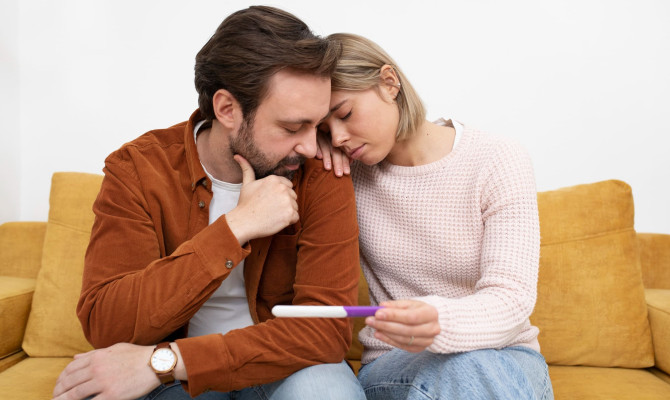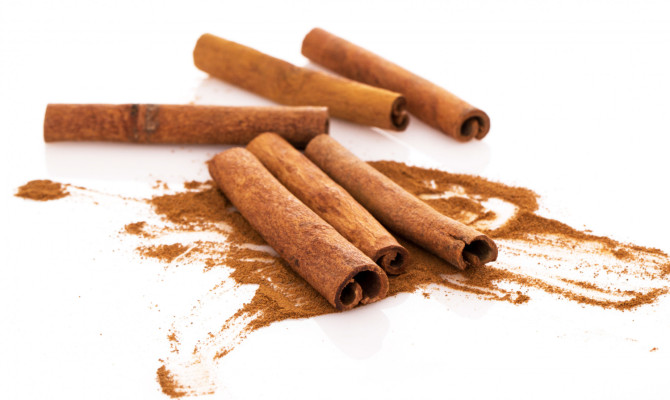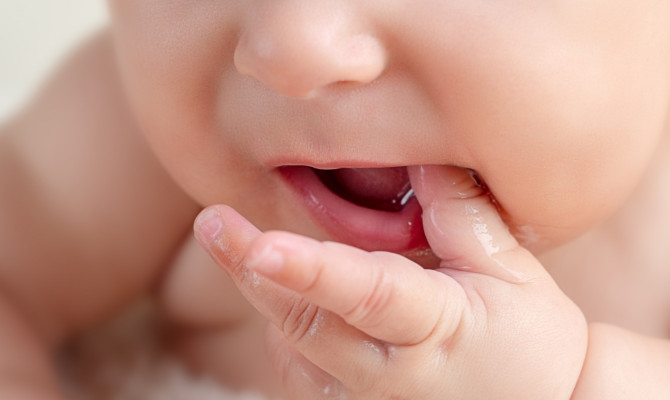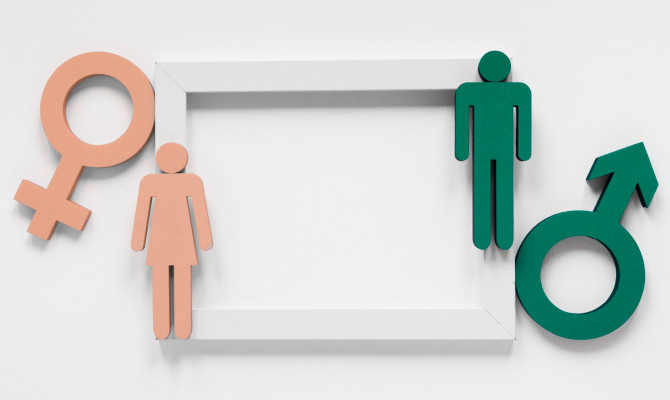Understanding The Importance Of Ovulation & The Signs That Ovulation Is Over

- Ovulation
- 15 Sep 2023
Introduction
What is Ovulation?
When a developed egg is released from the ovary and moved down the fallopian tube, this is called ovulation 1 Introduction| Researched based study from National Institutes of Health. About once a month, an egg will be ready to be released from one of your ovaries. When the egg is ready, the ovary releases it, and it goes through the fallopian tube and into the uterus, where it waits for sperm. The uterine lining has grown thicker to make room for the fertilized egg. If pregnancy has not taken place, then the lining of the uterus will be lost leading to bleeding. Menstruation is when an unfertilized egg and the wall of the uterus are shed.

Symptoms
What happens during Ovulation?
Most women ovulate about halfway through their monthly cycle. In a 28-day cycle, this is about 14 days before the first day of your next period. The exact time can change. Sometimes it’s hard to tell when you’re about to ovulate.
But there are some things you can pay attention to and keep track of overtime to help you figure out when you are most likely to get pregnant.
- Mucus changes
- Body temperature changes
- Increased sex drive
- Pelvic pain
- Breast tenderness
- Bloating
- Positive ovulation test
Mucus changes:
- You may notice that your vaginal fluid is clear, stretchy, and soft, like egg whites, around the time you ovulate.
- After ovulation, when the chance of getting pregnant goes down, the flow from the uterus tends to become cloudy and thick or go away completely.
Body temperature changes:
- When you just ovulated, your body temperature might go up by about 0.5 degrees Celsius.
- If you want to use your temperature to figure out when you are most likely to get pregnant, you need to take your temperature every morning before you get out of bed with a special thermometer.
- If you use a graph or worksheet to record the numbers every day, you can learn your trend over time.
- Around 2-3 days before the increase in body temperature is when you are highly fertile.
Increased sex drive:
- Some women have a higher libido around the time they ovulate. This is due to changes in hormones.
Mild pelvic pain or twinges:
- Some women may feel a slight ache or twinge on one side of their lower belly. This is called mittelschmerz. This happens because the egg comes out of the ovary.
Breast tenderness:
- Changes in hormones during pregnancy can cause your breasts to feel soft or sensitive.
Bloating:
- Hormonal changes can cause bloating or a feeling of fullness in the stomach for a short time.
Positive ovulation test:
- Ovulation prediction kits that look for a rise in luteinizing hormone (LH) in your pee can help you find your most active days.
Remember that these signs can come and go in different ways. If you are trying to get pregnant, keeping track of these signs can help you figure out when you are most likely to get pregnant.
But these signs aren’t always accurate, and the only way to be sure you’re ovulating is to get a medical test like an ultrasound or a hormone blood test.
Do you get pain when an egg is released?
- Yes, when an egg is released from the ovary, some women feel light to severe pelvic pain or soreness. This is called ovulation pain.
- People think that the pain comes from the ovary stretching or breaking as the egg is released. But not all women feel this pain, and the level of pain can change from person to person and from cycle to cycle.
- Pain from ovulation usually happens on one side of the lower belly and can last anywhere from a few minutes to a few hours.
- Most of the time, the pain feels like a dull ache, cramps, or a sharp twinge. If you are in a lot of pain or it lasts for a long time, you should see a doctor to rule out any underlying problems.
Ovulation Prediction
How do I know Ovulation is over?
Ovulation Predictor Kits (OPKs) are equipment that can tell you when you are about to ovulate and, hence, when you are most fertile. These tests are effective because they detect the increase in luteinizing hormone (LH) in your urine that occurs 24 to 36 hours before ovulation. This rise in LH makes the egg come out of the ovary.
Here’s how to use an ovulation kit 2 Ovulation Prediction| Researched based study from Better Health Channel:
- Choose the Right Kit: You can buy a reliable ovulation prediction kit at a drugstore or online. There are several brands, and they are sold in different forms, like test strips and digital readers.
- Test: Start checking a few days before you think you’ll cycle. This usually happens between days 10 and 12 of a 28-day cycle, but it can be different depending on how long your cycle is.
- Test Timing: The first pee of the day is the most concentrated, so that’s what you should use for the test. But if the directions say something different, do what they say. Don’t drink too much before a test because it can reduce the amount of hormones in your pee.
Keep in mind that ovulation predictor kits can tell you when you are most fertile and when is the best time to try to get pregnant. But they don’t make sure that ovulation will happen or that a baby will happen.
Lastly, OPKs can be helpful, but keeping track of other signs of ovulation can give you a better picture of your pregnancy trends like the following:
Find out how long your monthly cycle is:
- Count the days between the first day of your period and the day before it starts again. This is the length of your cycle.
Find out when ovulation is likely to happen:
- Take 14 days off of how long your cycle is. For instance, if your cycle lasts 28 days, you might ovulate around day 14. If you have a cycle that lasts 30 days, you might ovulate around day 16.
Think about more signs:
- Keep an eye out for other signs of ovulation, like changes in the mucus in your cervix, small pelvic pain or twinges, and a stronger desire to have sex. These signs will allow you to figure out ovulation time.
Look for changes in BBT (Basal Body Temperature)
- Because progesterone levels go up after you ovulate, your BBT tends to go up. If you keep track of your BBT for a few months, you can figure out when you ovulate.
When is the most fertile period?
- Most pregnancies occur in the five days before and on the day of ovulation. Having intercourse with a male up to 5 days before you release an egg makes it possible to get pregnant.
- The lifespan of a female egg is just 12–24 hours after ovulation.
- After this time is up, you have almost no chance of getting pregnant until your next period.
- Your chances of getting pregnant are best in the three days before and after you release an egg.
What does the last day of ovulation feel like?
- Most of the time, ovulation only lasts between 12 and 48 hours. During this period, the ovary releases an egg. Different women may feel differently on the last day of ovulation, and some may not feel any changes at all.
- Some women feel mild pain or twinges in their pelvis during ovulation. Any pain or discomfort you were feeling will go away as ovulation concludes.
Post Ovulation
What happens after Ovulation?
If fertilization does not happen after ovulation, the following usually happens:
Egg degeneration:
- The unfertilized egg is only good for about 24 hours before it dies.
- If a sperm doesn’t reach it during this time, the egg starts to degenerate.
Changes in your hormones:
- After ovulation, the level of the hormone progesterone starts to go up.
- This hormone helps the lining of the uterus get ready for a possible pregnancy by making it bigger and better able to hold an egg.
Rise in basal body temperature (BBT):
- Your basal body temperature (BBT) tends to go up after ovulation because your progesterone levels have gone up.
- This rise in warmth stays with you until your next period.
The “fertility window” shuts:
- Once ovulation is over and the egg can’t grow anymore, your fertility for that cycle goes down.
- The fertile window, which includes the days running up to ovulation and the day itself, closes.
Period begins:
- If you don’t get pregnant, the higher amounts of progesterone help keep the lining of your uterus healthy in case you do.
- But if you don’t get pregnant, your progesterone levels will finally go down, which will cause your uterus lining to fall off during your period.
If you’re using natural means of birth control, it’s also important to know your fertility trends so you don’t get pregnant.
Factors Affecting Ovulation

Factors that affect Ovulation
Ovulation is a complicated process 3Factors Affecting Ovulation| Researched based study from National Institutes of Health that is controlled by the way hormones work together in the body. Ovulation can be affected by a number of things, such as:
Balance of hormones:
- Hormones are the backbone of how the monthly cycle and pregnancy work. When chemicals like estrogen, progesterone, luteinizing hormone (LH), and follicle-stimulating hormone (FSH) are out of balance, it can change when and how often a woman ovulates.
Stress:
- The hypothalamus, a part of the brain that controls the menstrual cycle, can be affected by high amounts of stress.
- Stress can make menstruation happen less often or not at all.
Body weight and fat:
- Both being too thin and being obese can throw off the balance of hormones and cause ovulation to happen at odd times.
- This is because chemicals made by fat cells can affect the reproductive system.
Too much exercise:
- Intense or too much exercise can throw off the balance of hormones, especially in women with low body fat.
- This can cause your periods to be delayed or even cause you to miss ovulation.
Health issues:
- Polycystic ovary syndrome (PCOS) 1 Factors Affecting Ovulation| Researched based study from National Institutes of Health, and some long-term illnesses can make it hard to ovulate.
- Hormonal abnormalities are often the cause of these diseases.
Age:
- Age is associated with a decline in the quantity and quality of eggs produced by a woman’s ovaries.
- This can make pregnancy happen less often, which can lead to menopause.
Prescription drugs:
- Some medicines, like those used to treat long-term illnesses or chemical issues, can stop ovulation from happening.
- Chemotherapy and radiation treatment can also change how well the ovaries work.
Breastfeeding:
- When a woman only breastfeeds, especially in the first few months after giving birth, this can stop her from ovulating.
- This is called not having periods while breastfeeding.
Traveling and Changing Time Zones:
- Changes in time zones and sleep habits caused by travel can affect the way hormones work, which could affect pregnancy.
Environmental Factors:
- Exposure to certain toxins, chemicals that mess with hormones, and pollution can mess with the balance of hormones and ovulation.
Using tobacco and alcohol:
- Smoking and drinking too much can affect fertility and stop ovulation from happening.
Genetics:
- Some women are more likely to get diseases like PCOS, which can affect ovulation, because of their genes.
What is “Missed Ovulation”?
“Missed ovulation” or Anovulation means that ovulation did not happen during a woman’s monthly period. It can be caused by hormonal changes, like when the body doesn’t make enough estrogen, progesterone, LH, or FSH.
Effect of Missed Ovulation on fertility:
- If ovulation doesn’t happen, it can affect fertility in a big way. If there is no release of egg, it can’t be fertilized.
- If you’re trying to get pregnant and think you might have missed your ovulation, you should talk to a doctor or nurse for an evaluation and advice.
Remember that even women who have regular cycles can sometimes miss ovulation. But if you’re worried about your fertility or reproductive health, it’s better to talk to a professional.
Ovulation Induction
What is “Ovulation Induction “?
- Ovulation induction is a medical treatment in which drugs are used to help the ovaries to release eggs. It’s usually given to women who don’t ovulate regularly or who don’t ovulate at all, like those with polycystic ovary syndrome (PCOS) or who can’t get pregnant for no clear reason. 5 Ovulation Induction| Researched based study from National Institutes of Health
- Infertility treatments like intrauterine insemination (IUI) and in vitro fertilization (IVF) also use ovulation induction to improve the chances of fertilization.
- The choice of medicine relies on what’s causing the problem with ovulation, the patient’s medical background, and what a health care provider recommends.
- Ovulation induction needs close tracking with ultrasounds and hormone tests to track the growth of the follicle and make sure it’s the right time for sexual activity or assisted reproduction.
Importance
Why is it important to Ovulate?
- If you don’t ovulate once in a month, it might not be a big deal, but if it happens often or if you stop ovulating altogether (and don’t get hormones any other way), it can cause major health problems.
- When you ovulate, your body gets a lot of the hormones estrogen and progesterone that it needs. These hormones are important for a lot more than just getting pregnant.
- They affect your bone structure, heart health, metabolism, the quality of your sleep, your mental health, and a lot more. It’s important to get enough of them.
- Anovulation during a woman’s fertile years is linked to osteoporosis, heart disease, and some types of cancer in later life.
- Stress fractures are much more likely to happen to athletes who have problems with their periods.
Irregular Ovulation
Signs of an Irregular Ovulation
Irregular ovulation can cause your periods to be inconsistent or stop, and it may also affect your ability to have children. Here are some signs that you don’t ovulate regularly:
- Irregular periods: Having periods 4Irregular Ovulation| Researched based study from National Institutes of Health that vary a lot in length is one of the most common signs of ovulation that doesn’t happen regularly. For example, your cycles might always be shorter or longer than the average 21 to 35 days.
- Missed periods: Anovulation can lead to missed periods or long times when a woman doesn’t have her period.
- Abnormal bleeding: If you have very light, heavy, or irregular bleeding, it could be a sign that you don’t ovulate every month.
- Missing signs of ovulation: Around the time they ovulate, many women notice changes in the mucus in their cervix, sore breasts, or mild pelvic pain. If these signs are always missing, it could be a sign of irregular ovulation.
- Irregular Basal Body Temperature (BBT) Patterns: If you keep track of your BBT to find out when you ovulate, trends that don’t fit can be a sign that ovulation isn’t happening when you expect it to.
- Negative Ovulation test results: If you use ovulation prediction kits and always get negative results, this could mean that your ovulation isn’t normal.
- Difficult Fertile window: If you’re trying to get pregnant and have trouble figuring out when your fertile window is based on things like cervical mucus and BBT, it could be a sign that your ovulation isn’t regular.
- Signs of a hormonal imbalance: Some women who do not ovulate regularly may have hormonal problems like acne, too much facial hair, or mood swings. Thyroid problems or Polycystic ovary syndrome (PCOS) can sometimes cause ovulation to happen at odd times.
Boosting Ovulation
Foods that boost Ovulation
A well-balanced, nutrient-rich diet can help with general health and may help keep hormones in order, which in turn may help ovulation work well. Even though not one food is sure to make you ovulate more often, eating more of certain nutrients and food groups can help.
Here are a few foods and nutrients that could boost ovulation:
- Folate rich foods: Folate is important for healthy reproduction and is found in foods like spinach, kale, beans, lentils, and citrus fruits.
- Omega-3 Fatty Acids: Salmon, mackerel, sardines, flaxseeds, chia seeds, and walnuts all have omega-3 fatty acids, which may help keep hormones in balance.
- Foods that are high in antioxidants: Berries (blueberries, strawberries), bright veggies (carrots, bell peppers), and nuts all have a lot of antioxidants that are good for your health as a whole.
- Healthy fats: Avocado, olive oil, and nuts are all good sources of healthy fats, which are important for making hormones.
- Lean Proteins: Proteins that are low in fat, like chicken, fish, beans, and lentils, give you the amino acids you need to keep your hormones in balance.
- Complex Carbohydrates: Whole grains (like quinoa, brown rice, and oats) and starchy veggies give you long-lasting energy and help control your blood sugar levels, which can affect how your hormones work.
- Dairy or alternatives to dairy: Calcium and vitamin D are both important for sexual health and can be found in dairy products or options to dairy that have been enhanced.
- Iron-Rich Foods: Lean meats, beans, lentils, spinach, and grains with added iron are all good sources of iron, which is good for the health of your blood.
- Foods that are high in probiotics: Yogurt, kefir, cabbage, and kimchi all have probiotics that help keep the gut healthy. This can affect the balance of hormones.
- Foods that are high in zinc: Zinc is found in oysters, lean foods, pumpkin seeds, and whole grains. It is important for making hormones.
- Vitamin D: Fatty fish, dairy or dairy options that have been enhanced, and time spent in the sun all help keep vitamin D levels up, which can affect the health of hormones.
Takeaway
Significance of Ovulation
Ovulation signs are significant for many reasons, notably for women seeking to conceive or monitoring their reproductive health. These symptoms reveal ovulation and the fertile window, the best period to conceive.
Why are ovulation signals important?
- Tracking ovulation: It helps women monitor their most fertile days. Couples attempting to conceive need this. They may schedule intercourse to optimize fertilization by detecting the fertile window.
- Natural Family Planning: Ovulation signs are utilized for contraception. Avoiding sexual activity during the fertile window prevents conception.
- Effective Conception: Timing intercourse around ovulation enhances the chance of sperm meeting an egg. Knowing ovulation dates helps couples plan their efforts.
- Infertility Diagnosis: Irregular or no ovulation might indicate health concerns. Ovulation monitoring may detect reproductive issues early and allow for therapy.
- Maximizing Medical Interventions: Tracking ovulation helps doctors timing fertility treatments like IUI and IVF.
- Personal Empowerment: Knowing your body’s rhythms helps you make reproductive health choices. You connect more with your body and cycles.
- Hormonal Health: Ovulation indicators reveal hormonal cycle regularity and quality. This information may help discover hormonal abnormalities that influence health.
Any feedback on this article?
 This Articles content was accurate
This Articles content was accurate Very Informative Article
Very Informative Article I have a question or a comment
I have a question or a comment
 This article contains inaccurate content
This article contains inaccurate content This article was not helpful
This article was not helpful I have a question or a comment
I have a question or a comment
We appreciate your helpful feedback!
Checkout our social pages
References
-
National Institutes of Health
Introduction | Factors affecting Ovulation
-
Better Health Channel
Ovulation Prediction
-
National Institutes of Health
Factors affecting ovulation
-
National Institutes of Health
Irregular Ovulation
-
National Institutes of Health
Ovulation Induction
































